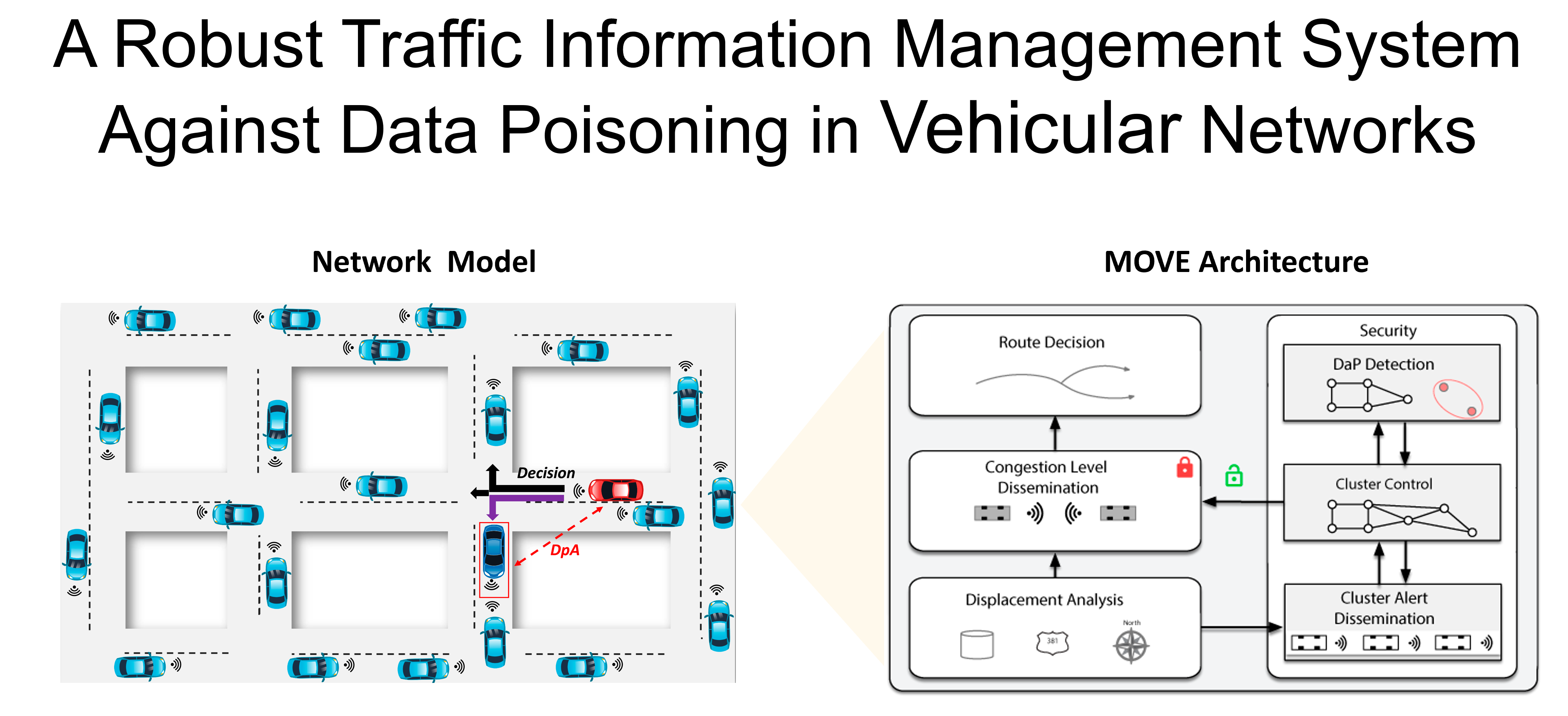A Robust Traffic Information Management System Against Data Poisoning in Vehicular Networks
Keywords:
Robust traffic management system, VANETs security, Attack detection and preventionAbstract
Due to the real-time demand and the amount of processed data, network security attacks are frequent concerns to the systems inspired by vehicular networks. Attacks that act to decrease data exchange reliability, such as Data Poisoning (DaP)attacks, are one of the most damaging. Although existing mechanisms provide data validation and collaborative threats detection, most vehicular network systems do not implement these features. This work presents MOVE, an efficient, secure, and VANET-based traffic management system against DaP attacks. MOVE employs watchdog monitoring along with relational consensus for network attacks detection, aiming for data authenticity and availability. MOVE’s performance was evaluated on OMNET++, reaching 90% of detection rate, 4% of false-negative, and 10% of false-positive. Further, MOVE decreases the vehicles’ travel time by up to 40%, average time lost due to traffic jams by 35%, and MOVE increases the average speed by 12% comparing to ON-DEMAND.
Downloads
References
F. R. Soriano, J. J. Samper-Zapater, J. J. Martinez-Dura, R. V. Cirilo-Gimeno, and J. Martinez Plume, “Smart mobility trends: Open data and other tools,”IEEE Intelligent Trans. Systems Magazine, no. 2, 2018
A. Thakur and R. Malekian, “Fog computing for detecting vehicular congestion, an internet of vehicles based approach: A review,”IEEE Intelligent Transportation Systems Magazine, 2019.
Y. V. Brandão, L. M. De Souza, T. S. Gomides, R. E. De Grande, F. S. H. Souza, and D. L. Guidoni, “A multi-layer and vanet-based approach to improve accident management in smart cities,” in2020 16thInternational Conference on Distributed Computing in Sensor Systems(DCOSS), pp. 165–172, 2020.
T. S. Gomides, R. E. De Grande, A. M. de Souza, F. S. Souza, L. A. Villas, and D. L. Guidoni, “An adaptive and distributed traffic management system using vehicular ad-hoc networks, ”Computer Communications, vol. 159, pp. 317 – 330, 2020.
D. L. Guidoni, G. Maia, F. S. H. Souza, L. A. Villas, and A. A. F. Loureiro, “Vehicular traffic management based on traffic engineering for vehicular ad-hoc networks, ”IEEE Access, 2020.
Z. Lu, G. Qu, and Z. Liu, “A survey on recent advances in vehicular network security, trust, and privacy,”IEEE Transactions on Intelligent Transportation Systems, no. 2, 2019.
M. Arif, G. Wang, M. Zakirul Alam Bhuiyan, T. Wang, and J. Chen, “A survey on security attacks in vanets: Communication, applications and challenges,” 2019.
S. Su, Z. Tian, S. Liang, S. Li, S. Du, and N. Guizani, “A reputation management scheme for efficient malicious vehicle identification over5g networks,”IEEE Wireless Comm., vol. 27, no. 3, pp. 46–52, 2020.
A. Sen and S. Madria, “Risk assessment in a sensor cloud framework using attack graphs, ”IEEE Transactions on Services Computing, 2017.
R. Deng, G. Xiao, R. Lu, H. Liang, and A. V. Vasilakos, “False data injection on state estimation in power systems—attacks, impacts, and defense: A survey, ”IEEE Transactions on Industrial Informatics, 2016.
B. Li, R. Lu, W. Wang, and K.-K. R. Choo, “Distributed host-based collaborative detection for false data injection attacks in smart grid cyber-physical system,”Journal of Parallel and Dist. Computing, 2017.
A. L. Santos, C. A. Cervantes, M. Nogueira, and B. Kantarci, “Clustering and reliability-driven mitigation of routing attacks in massive iot systems, ”JISA, 2019.
A. M. de Souza, N. L. S. da Fonseca, and L. A. Villas, “A fully-distributed advanced traffic management system based on opportunistic content sharing, ”2017 IEEE Int. Conf. on Communications (ICC), 2017.
M. A. Khan, M. S. Sheikh, and J. Liang, “A comprehensive survey on vanet security services in traffic management system,”Wireless Communications and Mobile Computing, 2019.
C. Zhang, K. Chen, X. Zeng, and X. Xue, “Misbehavior detection based on support vector machine and dempster-shafer theory of evidence invanets,”IEEE Access, 2018.
Z. Tian, X. Gao, S. Su, and J. Qiu, “Vcash: A novel reputation framework for identifying denial of traffic service in internet of connected vehicles,”IEEE IOT Journal, vol. 7, no. 5, pp. 3901–3909, 2019.
J. Kamel, M. R. Ansari, J. Petit, A. Kaiser, I. B. Jemaa, and P. Urien,“Simulation framework for misbehavior detection in vehicular net-works,”IEEE Transactions on Vehicular Technology, 2020.
C. Pedroso, A. dos Santos, and M. Nogueira, “Detecting fdi attack on dense iot network with distributed filtering collaboration and consensus, ”in IEEE LATINCOM 2020, nov 2020.
M. Toulouse, B. Q. Minh, and P. Curtis, “A consensus -based network intrusion detection system,” in2015 5th ICITCS, IEEE, 2015.
T. S. Gomides, “An adaptive and distributed traffic management system for vehicular ad-hoc networks,” Master’s thesis, Federal University of Sao Joao del Rei, 2020.


